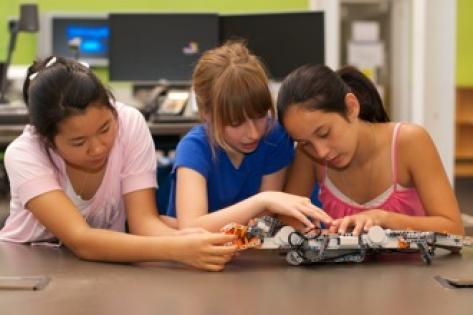It’s a truism that there can be only one winner but when you consider the claims of the nominees in the 2012 Young Australian of the Year, it must have been a hard choice for the judges. They are all impressive and you can read about them here.
The winner is the nominee from Victoria, 22 year old Marita Cheng of Cairns where she was also named Young Citizen of the Year in 2007.
Marita is studying for Engineering and Computer Science degrees at the University of Melbourne and is a passionate advocate of women studying maths and science. In 2008, she founded Robogals Global as a way of encouraging schoolgirls to study subjects that can lead to careers in the science, technology, engineering and mathematics (STEM) fields. Robogals has run robotics workshops for 3,000 girls across 80 schools in Australia and is also now operating in New Zealand and the UK. She started Robogals as a way of encouraging more girls to study maths and science and to demonstrate just what fun a STEM related career can be. Her ambition is to start a robotics company, creating robots that will take care of many everyday and mundane tasks.
Marita’s win is also a fillip for leading scientists and educators who are concerned about the small number of school students – girls and boys - studying maths and science. The long term impact of this threatens Australia's ability to:
· be competitive internationally
· develop new technologies and scientific breakthroughs
· create wealth-generating industries, and
· contribute to the international community of STEM innovation.
Such is the level of concern that Australia’s Chief Scientist, Professor Ian Chubb (a former Vice-Chancellor of Flinders University and the ANU) has described the shortage of students studying STEM subjects as a “national emergency”. Professor Chubb will present a manifesto to the Gillard Government in March on how to make maths and science more attractive to students.
An early study commissioned by Professor Chubb and undertaken by Universities Australia shows that the subjects have an image problem. They are seen as boring and “nerdy”, with students not seeing the subjects as leading to an interesting career.
Universities Australia CEO, Dr Glenn Withers said that he believes maths and science need to be “reinvigorated” in the classroom.
“It seems science and maths cannot be taught effectively in a static, textbook focussed environment. For example, instead of just studying the composition of various metals, allowing students to see the role these metals play in car manufacturing illustrates the value of science and maths in a way they can immediately relate to.”
With Professor Chubb referring to “how much work we have to do to turn things around” only last week, having the Young Australian of the Year as a role model should be very helpful to the cause.
Marita Cheng says she wants to use the year “to speak to thought leaders ... to make a difference to the way maths and sciences are taught in Australia so kids can get excited about these subjects.
“The real problem is the cultural perception about what an engineer is,” says Cheng. “They think an engineer wears hard hats and works in boiler rooms and it’s a dirty job.
“But there are so many opportunities with an engineering degree. CEOs have engineering degrees. You can get into commerce or business. You learn how to problem solve. It gives you a really good tool kit. It is also very creative and collaborative, you can travel a lot and really make a difference.”
Marita Cheng says it is important that students are exposed to role models in maths and science who are excited about their jobs “so students can be excited too”.
***
Further information
- Check out the other nominees for Young Australian of the Year, and further information on Australian of the Year at www.australianoftheyear.org.au








 Agree (0)
Agree (0) Disagree (
Disagree (







__small.png)










